
Computer Lenses Make Screen Work Stress Free
In today's digital age, our eyes are subjected to prolonged exposure to computer screens, leading to digital eye strain and discomfort. Fortunately, computer glasses/lenses have emerged as an effective solution to alleviate the visual challenges posed by our technology-driven lifestyles. Computer lenses are a type of task-specific, or lifestyle, prescription lenses that are designed with features specifically to maximize the optical performance and health features when performing computer work. If you spend a lot of time in front a computer for school, for workplace, or for recreational gaming, computer lenses may be the best option for your lifestyle. Visit our Edmonton optometrists and opticians today to begin seeing your best.
Schedule An Exam Our Optometrists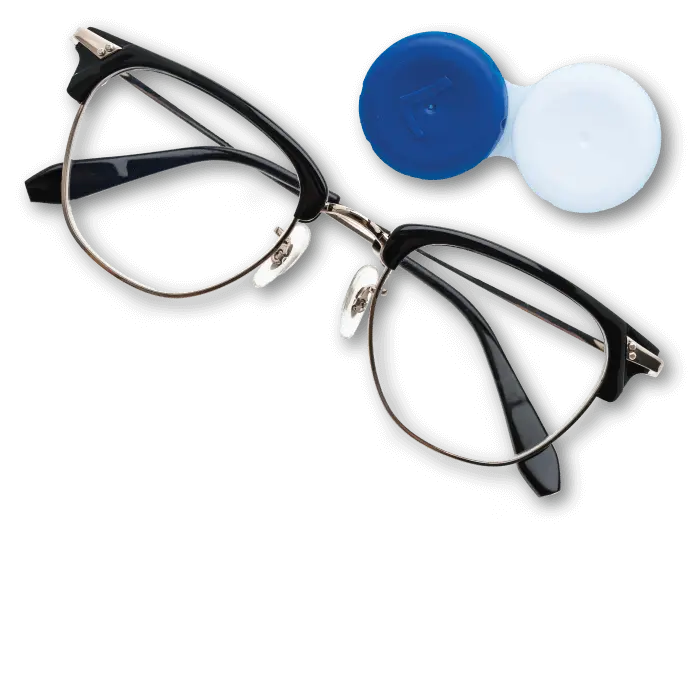
(780) 473-6123
Modern Eye Glasses in Edmonton.
What Are Computer Lenses?
Computer glasses contain prescription lenses made specifically designed and crafted to optimize visual comfort and to help your eyes easily focus during extended computer use. Computer lenses differ from standard eyeglasses and reading glasses in several ways, including:
- When working on a computer, you are typically positioned 20 to 26 inches away from it, which is considered the intermediate zone of vision. This distance is closer than driving (i.e., distant) vision, but farther away than reading (i.e., near) vision.
- Computer glasses/lenses include advanced coatings that selectively filter out high energy blue light, reducing eye strain and improving sleep quality.
- These lens coatings minimize the glare from screens and artificial lighting sources, enhancing visual clarity, reducing discomfort, and reducing eye strain.
- Computer lenses are designed to enhance contrast and reduce the visual fatigue caused by prolonged screen exposure.

Computer/Office Glasses.
Benefits of Computer Lenses?
Computer glasses used to be recommended for people over 35 years of age to help focus their vision on the screen. Now that digital technology is used more frequently, the general population could benefit from using computer glasses, at any age. Advantages of wearing glasses designed specifically for computer use include:
- Computer glasses can help protect your eyes from strain and fatigue caused by computer vision syndrome.
- Glasses for computer use provide the clear vision you need to view your screen, minimizing the need to hunch or tilt your head to focus.
- When paired with anti-reflective coating, computer glasses can minimize glare caused by the computer screen.
- Computer glasses with a blue light filter can protect your eyes from harmful blue light radiation transmitted from digital screens.
- Increased magnification for intermediate (arm length) distances transmitted from digital screens.
- Progressive computer glasses have a larger portion of the lens dedicated to intermediate vision, enabling more natural later eye movement than traditional progressive lenses.

Modern Eye Glasses in Edmonton.
What Are Computer Lenses?
Computer glasses contain prescription lenses made specifically designed and crafted to optimize visual comfort and to help your eyes easily focus during extended computer use. Computer lenses differ from standard eyeglasses and reading glasses in several ways, including:
- When working on a computer, you are typically positioned 20 to 26 inches away from it, which is considered the intermediate zone of vision. This distance is closer than driving (i.e., distant) vision, but farther away than reading (i.e., near) vision.
- Computer glasses/lenses include advanced coatings that selectively filter out high energy blue light, reducing eye strain and improving sleep quality.
- These lens coatings minimize the glare from screens and artificial lighting sources, enhancing visual clarity, reducing discomfort, and reducing eye strain.
- Computer lenses are designed to enhance contrast and reduce the visual fatigue caused by prolonged screen exposure.

Modern Eye Glasses in Edmonton.
Types of Computer Lenses
Several lens design options exist for computer-specific eyeglass lenses. The best design option for an individual depends on their vision needs (i.e., prescription), type of work, and personal preferences.
- Single-vision glasses designed for computer work will provide the appropriate optical correction for the working distance between the screen and the eyes. This option allows users to view the whole of the screen with minimum vertical head movement. A disadvantage of this solution is that both distant objects and reading materials at a shorter distance of the computer screen will appear blurry.
- Bifocal glasses (i.e., a lined bifocal) can be prescribed for the upper segment to be dedicated to screen distance vision and the lower segment for work at reading distance. Shortcomings of the biofcal option is that objects farther away than the screen will be blurry, objects become distorted in the peripheral zone of the lenses, and that lined multifocal lenses have a smaller area for viewing the screen - meaning more head movement may be required to view all parts of the screen.
- Trifocal glasses have lenses that combine a segment for distant vision, another for near vision, and a third one for intermediate vision at screen distance. Like bifocal lenses, trifocal lenses suffer from peripheral distortion and a limited viewing zone.
- Progressive lenses offer three benchmark viewing zones (near, intermediate, and distance), but without the visual lines of bifocals and trifocals. However, traditional progressive lens designs feature a limited horizontal area devoted to intermediate vision, which can make hortionzal head movement necessary to view the entire screen. Modern digital freeform progressive lenses can be customized to increase the area of the lenses devoted to computer vision.

Computer Glasses For A Digital World.
What Is Computer Vision Syndrome?
The term computer vision syndrome (CVS) or digital eye strain has been coined to refer to computer and digital device (tablet, cell phone, e-reader) vision-related problems such as eyestrain, headaches, blurred vision, dry eyes, and neck and shoulder pain. The symptoms are often caused by one or more of the following:
- Uncorrected Vision (i.e., Refractive Errors)
- Improper Viewing Distances
- Poor Sitting Posture
- Digital Screen Glare
- Poor Lighting
- Lighting Temperature

Customizing Your Computer Lenses
Computer lenses from Hoya, Zeiss, and Essilor, can be customized with additonal lens coatings and features.

Blue Light Filter
- Greaty For Heavy Screen Use
- Improved Sleep
- Minimized Eye Strain
- Less Dry Eye Symptoms
- Reduced HEV Light
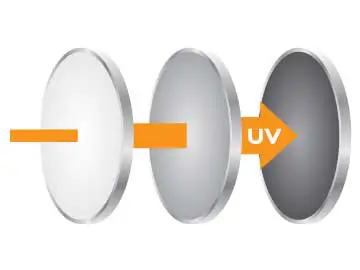
UV Reactive Lenses
- All-In-One Glasses/Sunglasses
- Easy Eyewear Care
- UV Protection
- Dynamic Sun Protection
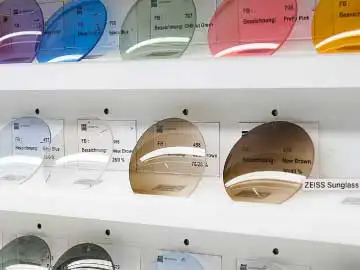
Lens Tints
- Customize Light Transmittance
- Choose Your Favourite Colour
- Find A Colour That Provide You With Relaxed Vision
- Pick Yellow To Reduce Glare
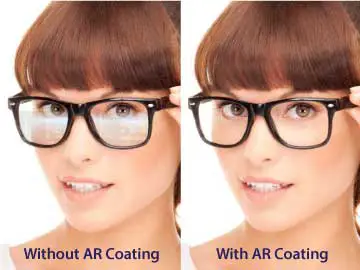
Anti-Reflection Coatings
- Reduce Eye Strain
- Eliminate Unflattering Glare
- Minimum Squinting
- Highly Recommended For Screen Use
- Minimize Headaches
All Ages Enjoy A Digital Lifestyle.
Computer Glasses For Younger Individuals
Computer work involves focusing the eyes at close distances. Monitors are often placed too close (closer than the eye's default accommodation distance) to the operator because of space constraints in offices. People of all ages may experience symptoms of computer vision syndrome, and may require computer glasses to reduce these symptoms. No matter your age, you should talk with an optometrist about the kind of work you do, how much time you work on a computer, how the work station is set up, and so on.
Schedule V-eye-P Eyewear Fitting

New Generation Computer Glasses.
Leading Computer Lenses
Leading single vision and progressive computer lens options include the following:
- A single vision anti-fatigue lens that makes it easier to use digital devices such as smartphones and computers. Designed with a slight plus progression towards the bottom of the lens, Nulux Active TrueForm stops the eye continually focusing and refocusing, reducing eyestrain and optical fatigue.
- A single vision anti-fatigue lens that includes a small area of added power at the bottom of the lens that gives your vision a slight magnification to help relax your eye muscles and make focusing easier.
- A progrssive lens best for laptop, desk work and reading and viewing distance of less than 2 feet.
- A progressive lens that provides a wide field of clear vision out to 3 feet (100cm). Best for laptop use.
- A progressive lens most popular for office and workstation settings with dual monitors and viewing distances of 2-3 feet. Excellent for professions that require smooth, sharp depth and width vision from near distances up to 2 metres.
- A progressive lens that provide a wide field of view out to 7 feet (200cm). Best for multiple monitor desktop use.
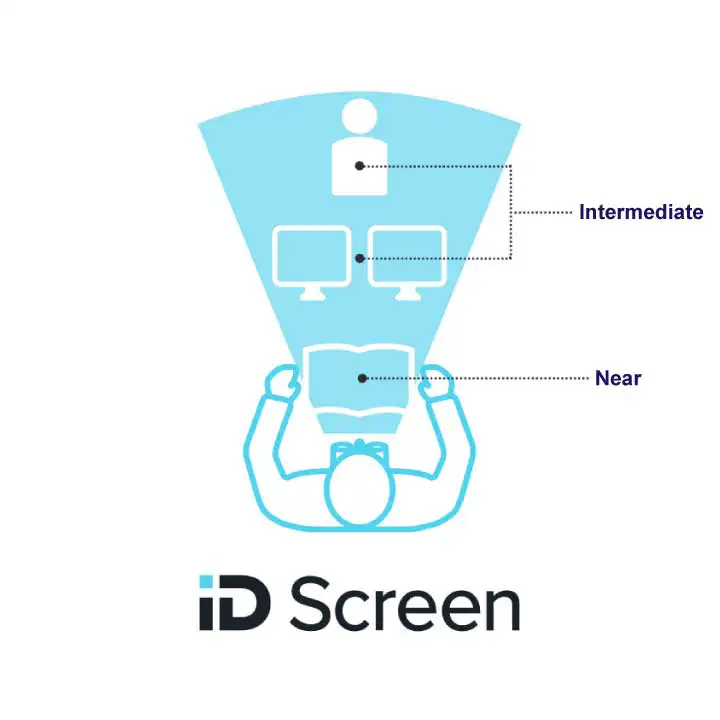
Task-Specific Eye Glass Lenses.
Computer Lenses Need To Be Professionally Measured
Contrary to claims made by online sellers, the creation of computer lenses that deliver clear, high-definition vision necessitates a multitude of meticulous measurements. These measurements include pupillary distances for both near and far focal lengths, optical center, heights, vertex (i.e., the distance between the eye and the back of the lens), pantoscopic tilt (i.e., the angle of the lens from vertical), and wrap angle (i.e., the angle at which the lenses curve around the head). These measurements are unique to each person, taking into account their biology, behavioral preferences, frame type, frame fit, and prescription. To ensure utmost accuracy, modern digital tools must be employed for obtaining precise measurements, and the chosen frame must be expertly fitted and professionally adjusted to guarantee customized results tailored to the individual.
Schedule V-eye-P Eyewear Fitting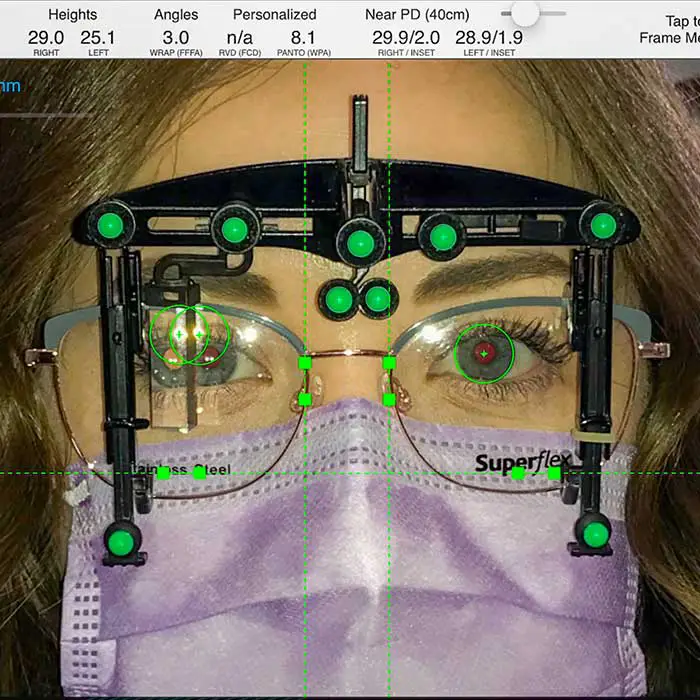
Prescription Lens Brands
Frequently Asked Questions
Our Edmonton Optometrists
Searching for an optometrist in Edmonton? Our experienced Edmonton eye doctors use advanced modern technologies and devote upwards of 500% more time towards providing personalized patient care than elsewhere so that they can see more and ensure that you may never see less. Position yourself to see the future with a visit to our eye clinic and Edmonton's best eye care!

Dr. Jennifer Ash, OD
Dr. Jennifer Ash is the Resident Optometrist at Eye-deology Vision Care. Dr. Ash provides patient care 5 days a week. Read more about Dr. Ash.

Dr. Ruhee Kurji, OD
Dr. Ruhee Kurji is an Associate Optometrist at Eye-deology Vision Care. Dr. Kurji provides patient care Tuesdays & Fridays. Read more about Dr. Kurji.

Dr. Jade McLachlin, OD
Dr. Jade McLachlin is an Associate Optometrist at Eye-deology Vision Care. Dr. McLachlin provides patient care 5 days a week. Read more about Dr. McLachlin.

Dr. Tania Mathews, OD
Dr. Tania Mathews is an Associate Optometrist at Eye-deology Vision Care. Dr. Mathews provides patient care 2 days a week. Read more about Dr. Mathews.
Learn Why Our Edmonton Optometrists Are The Best!






